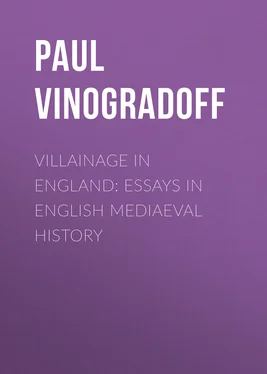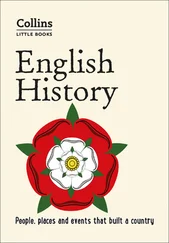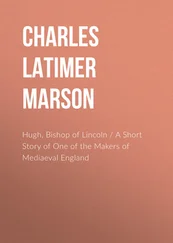Paul Vinogradoff - Villainage in England - Essays in English Mediaeval History
Здесь есть возможность читать онлайн «Paul Vinogradoff - Villainage in England - Essays in English Mediaeval History» — ознакомительный отрывок электронной книги совершенно бесплатно, а после прочтения отрывка купить полную версию. В некоторых случаях можно слушать аудио, скачать через торрент в формате fb2 и присутствует краткое содержание. Жанр: foreign_prose, Юриспруденция, История, foreign_edu, foreign_antique, на английском языке. Описание произведения, (предисловие) а так же отзывы посетителей доступны на портале библиотеки ЛибКат.
- Название:Villainage in England: Essays in English Mediaeval History
- Автор:
- Жанр:
- Год:неизвестен
- ISBN:нет данных
- Рейтинг книги:4 / 5. Голосов: 1
-
Избранное:Добавить в избранное
- Отзывы:
-
Ваша оценка:
- 80
- 1
- 2
- 3
- 4
- 5
Villainage in England: Essays in English Mediaeval History: краткое содержание, описание и аннотация
Предлагаем к чтению аннотацию, описание, краткое содержание или предисловие (зависит от того, что написал сам автор книги «Villainage in England: Essays in English Mediaeval History»). Если вы не нашли необходимую информацию о книге — напишите в комментариях, мы постараемся отыскать её.
Villainage in England: Essays in English Mediaeval History — читать онлайн ознакомительный отрывок
Ниже представлен текст книги, разбитый по страницам. Система сохранения места последней прочитанной страницы, позволяет с удобством читать онлайн бесплатно книгу «Villainage in England: Essays in English Mediaeval History», без необходимости каждый раз заново искать на чём Вы остановились. Поставьте закладку, и сможете в любой момент перейти на страницу, на которой закончили чтение.
Интервал:
Закладка:
Villain socage.
In the time of Henry III and of the Edwards the nature of ancient demesne tenure was better understood. At the close of the thirteenth century the lawyers distinguish three kinds of men—free, villains, and socmen 228 228 Y.B., 21/22 Edw. I, p. 499: 'Treis maners de gents.'
. In order to be quite accurate people spoke of villain socmen or little socage 229 229 Bracton, f. 209: Fitzherbert, Monstrav. 3 (Pasch. 41 Edw. III): ' Belknap : Mesmes les tenementz en auncien temps fuerent en mains le petit sokmans, et eux fierent teux services comme gents de petits sokemans fierent en auncien temps et eux les teignent comme gents de petit sokmans.'
in opposition to free. But even at that time there were several confusing features about the case. The certainty of condition made the tenure of the villain socmen so like a freehold that it was often treated as such in the manorial documents. In the Stoneleigh Register the peculiar nature of socage in ancient demesne is described fully and clearly. It is distinguished in so many words from tenancy at will, and a detailed description of conveyance by surrender in contrast with conveyance by charter seems to give the necessary material for the distinction between it and freehold 230 230 Stoneleigh Reg., 32: 'Et quod in eodem manerio sunt diuerse tenure secundum consuetudinem manerii illius totis temporibus retroactis usitatam, videlicet quidam tenentes eiusdem manerii tenent terras et tenementa sua in sokemanria de feodo et hereditate de qua quidem tenura talis habetur et omni tempore habebatur consuetudo, videlicet quod quando aliquis tenens eiusdem tenure terram suam alicui alienare uoluerit, veniet in curiam coram ipso Abbate vel eius senescallo et per uirgam sursum reddat in manum domini terram sic alienandam.... Et si aliquis terram aliquam huiusmodi tenure infra manerium predictum per cartam uel sine carta absque licentia dicti Abbatis alienauerit aliter quam per sursum reddicionem in curia in forma predicta, quod terra sic extra curiam alienata domino dicti manerii erit forisfacta in perpetuum. Dicunt eciam quod quidam sunt tenentes eiusdem manerii ad voluntatem eiusdem Abbatis. Et si quis eorundem tenencium terram sic ad voluntatem tentam alienauerit in feodo, quod liceat dicto Abbati terram illam intrare et illam tanquam sibi forisfactam sibi in perpetuum retinere.'
. But still the fundamental notion of free men holding in villainage gets lost sight of. Only some of the cottiers are said to hold in villainage. The more important tenants, the socmen holding virgates and half-virgates, are not only currently described as freeholders in the Register, but they are entered as such on the Warwickshire Hundred Roll 231 231 A comparison of the data in the Stoneleigh Register and in the Roll is given in App. VI. Cf. Bract. Note-book, pl. 834: 'Legales homines de manerio de Havering.'
. The term 'parva sokemanria' is applied in the Stoneleigh Register only to a few subordinate holdings which are undoubtedly above the level of pure villainage, but cannot be definitely distinguished from the other kinds of socage in the Register. This may serve as an indication of the tendency of manorial communities to consider privileged villainage as a free tenure, but legal pleadings and decisions were also creating confusion for another reason, because they tended, as has been said, to consider the whole body of men on the ancient demesne in one lump as it were. The courts very often applied as the one test of tenure and service the question whether a person was a descendant by blood of men of ancient demesne or a stranger 232 232 Coram Rege, Mich. 5 Edw. I, m. 77: '(Juratores) quesiti si predicti Margeria et alii et omnes antecessores a tempore quo non extat memoria terras suas successiue de heredibus in heredes tenuerint uel ipsi aut aliquis antecessorum suorum sunt vel fuerint aduenticii, dicunt quod ignorant.'
. In connexion with this the court rolls testify to the particular care taken to control any intrusion of strangers into the boundaries of a privileged manor 233 233 Court Rolls of King's Ripton, Augment. Off. xxiii. 94, m. 7: 'Memorandum quod concessum est Rogero de Kenlowe habendum introitum ad Caterinam filiam Thome prepositi cum uno quarterio terre in villa de Ryptone Regis pro duabus solidis in gersuma, ita tamen quod mortua dicta Katerina ille qui propinquior est heres de sanguine predicte Katerine gersumabit dictum quarterium terre secundum consuetudinem manerii et ville.' A. r. r. Edw. xxiii, m. 8, v: 'Nicholaus de Aula reddit sursum unam dimidiam acram terre ad opus Willelmi ad portam de Broucton.... Et preceptum preposito respondere de exitibus eiusdem terre quia est extraneus.... Johannes Arnold reddit sursum duas rodas terre ad opus Hugonis Palmeri.... Et preceptum est quod ponatur in seysinam, quia est de sanguine de Riptone Regis.'
. This was done primarily in the interests of the lord, but the tenantry also seem to have sometimes been jealous of their prerogatives 234 234 Court Rolls of King's Ripton, Augment. Off. xxiii. 94, m. 15: 'Curia de Kingsripton tenta die Jovis proxima post translacionem S ti . Benedicti anno r. r. E. xxix n et dom. Joh. [abb. xv. Venit] Willelmus fil. Thome Unfroy de Kingesripton et reddidit sursum in manibus senescalli totum jus quod [habuit] in illis tribus acris terre in campis de Kingesriptone quondam Willelmi capellani de eadem [villa ad opus filiorum] Rogeri de Kellawe extranei legitime procreatorum de Katerina filia Thome prepositi que est de con[dicione sokemannorum?] bondorum de Kingesripton.... Rogerus de Kellawe extraneus qui se maritauit cuidam Katerine filie Thome prepositi de Kingesripton que est de nacione et condicione eiusdem ville venit et petiit in curia nomine filiorum suorum ex legitimo matrimonio exeuntium de corpore prefate Katerine illas vi acras terre.... (Juratores dicunt) quod nichil inde sciunt nec aliquid super isto articulo presentare volunt ad presens. Et sic infecto negocio maximo contemptu domini et balliuorum suorum extra curiam recesserunt. Et ideo preceptum est balliuis quod die in … faciant de eisdem juratis xl solidos ad opus domini.'
, and it is only in the course of the fourteenth century that they begin to open their gates to strangers, 'adventicii 235 235 Stoneleigh Reg., 30 (Edward II injunction): 'Et quidam forinseci qui sokemanni non sunt auctoritate sua propria et per negligenciam dicti Abbatis et conuentus, ut dicitur, a quibusdam sokemannorum illorum quasdam terras et tenementa alienaverunt. Nos igitur super premissis plenius certiorari uolentes assignavimus vos una cum his, quos vobis associaveritis, ad inquirendum qui sokemanni huiusmodi terras et tenementa ibidem alienauerunt huiusmodi forinsecis aut extrinsecis et quibus,' etc. Cf. the Statute of 1 Richard II, Stat. 1. cap. 6. It was altogether a dangerous transaction for the socmen, because they were risking their privileges thereby. It must have been lucrative.
.' However this may be, the practice of drawing the line between native stock and strangers undoubtedly countenanced the idea that all the tenants of native stock were alike, and in this way tended to confuse the distinction between freeholders, pure villains, and villain socmen.
The courts made several attempts to insist on a firm classification, but some of these were conceived in such an unhappy spirit that they actually embroiled matters. The conduct of the king's judges was especially misdirected in one famous case which came up several times before the courts during the thirteenth century. The tenants of Tavistock in Devonshire were seeking protection against their lords, and appealing to the right of ancient demesne. The case was debated two or three times during Henry III's reign, and in 1279 judgment was given against the plaintiffs by an imposing quorum, as many as eight judges with the Chief Justice Ralph Hengham at their head. It was conceded that Tavistock was ancient demesne, but the claimants were held to be villains and not villain socmen, and this on the ground that the Domesday description did not mention socmen, but only villains 236 236 Placitorum Abbrev., p. 270 (Coram Rege, Mich. 7/8 Edw. I): 'Et eciam comperto in libro de Domesday quod non fit aliqua mencio de sokemannis set tantummodo de villanis et servis et eciam comperto per inquisicionem quod multi eorum sunt adventicii quibus tenementa sua tradita fuerunt ad voluntatem dominorum suorum … consideraverunt quod predictus Galfridus eat inde sine die et quod predicti homines teneant tenementa predicta in predicto manerio per servilia servicia si voluerint, salvo statu corporum suorum, et quod de cetero non possunt clamare aliquod certum statum et sint in misericordia pro falso clameo.'
. It seems strange to dispute a decision given with such solemnity by men who were much better placed to know about these things than we are, but there does not seem to be any possible doubt that Hengham and his companions were entirely wrong. Their decision is in contradiction with almost all the recorded cases; it was always assumed that the stiff Domesday terminology was quite insufficient to show whether a man was a pure villain or a free man holding in villainage, which last would be the villain socman in ancient demesne. If Hengham's doctrine had been taken as a basis for decision in these cases, no ancient demesne tenancy would have been recognised at all out of the Danelaw counties, that is in far the greater part of England, as Domesday never mentions socmen there at all. In the Danelaw counties, on the other hand, the privilege would have been of no use, as those who were called socmen there were freeholders protected without any reference to ancient demesne. Altogether the attempt to make Domesday serve the purpose of establishing the mode of tenure for the thirteenth century must be called a misdirected one. It was quite singular, as the courts generally went back upon Domesday only with the object of finding out whether a particular manor had been vested in the crown at the time of the Conquest or not. It should be noted that Bracton considered the case from a very different point of view, as one may judge by the note he jotted down on the margin of his Note-book against a trial of 1237-8. He says: 'Nota de villanis Henrici de Tracy de Tawystoke qui nunquam fuerunt in manu Domini Regis nec antecessorum suorum et loquebantur de tempore Regis Edwardi coram W. de Wiltona 237 237 Bract. Note-book, pl. 1237.
.' Wilton's decision must have been grounded on the assumption that the ancestors of the claimants were strangers to the manor, or else that the manor had never formed part of the ancient demesne. This would, of course, be in direct contradiction to the opinion that the Tavistock tenants were descended from the king's born villains.
Интервал:
Закладка:
Похожие книги на «Villainage in England: Essays in English Mediaeval History»
Представляем Вашему вниманию похожие книги на «Villainage in England: Essays in English Mediaeval History» списком для выбора. Мы отобрали схожую по названию и смыслу литературу в надежде предоставить читателям больше вариантов отыскать новые, интересные, ещё непрочитанные произведения.
Обсуждение, отзывы о книге «Villainage in England: Essays in English Mediaeval History» и просто собственные мнения читателей. Оставьте ваши комментарии, напишите, что Вы думаете о произведении, его смысле или главных героях. Укажите что конкретно понравилось, а что нет, и почему Вы так считаете.












